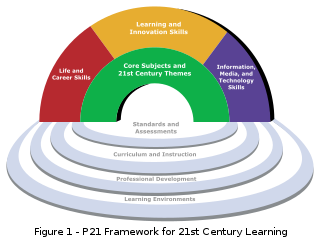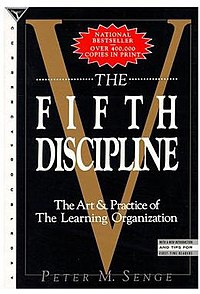A teaching method comprises the principles and methods used by teachers to enable student learning. These strategies are determined partly on subject matter to be taught and partly by the nature of the learner. For a particular teaching method to be appropriate and efficient it has take into account the learner, the nature of the subject matter, and the type of learning it is supposed to bring about.
Bohm Dialogue is a freely flowing group conversation in which participants attempt to reach a common understanding, experiencing everyone's point of view fully, equally and nonjudgmentally. This can lead to new and deeper understanding. The purpose is to solve the communication crises that face society, and indeed the whole of human nature and consciousness. It utilizes a theoretical understanding of the way thoughts relate to universal reality. It is named after physicist David Bohm who originally proposed this form of dialogue.
Organization development (OD) is the study and implementation of practices, systems, and techniques that affect organizational change. The goal of which is to modify a group's/organization's performance and/or culture. The organizational changes are typically initiated by the group's stakeholders. OD emerged from human relations studies in the 1930s, during which psychologists realized that organizational structures and processes influence worker behavior and motivation.

Peter Michael Senge is an American systems scientist who is a senior lecturer at the MIT Sloan School of Management, co-faculty at the New England Complex Systems Institute, and the founder of the Society for Organizational Learning. He is known as the author of the book The Fifth Discipline: The Art and Practice of the Learning Organization.
In the field of management, strategic management involves the formulation and implementation of the major goals and initiatives taken by an organization's managers on behalf of stakeholders, based on consideration of resources and an assessment of the internal and external environments in which the organization operates. Strategic management provides overall direction to an enterprise and involves specifying the organization's objectives, developing policies and plans to achieve those objectives, and then allocating resources to implement the plans. Academics and practicing managers have developed numerous models and frameworks to assist in strategic decision-making in the context of complex environments and competitive dynamics. Strategic management is not static in nature; the models can include a feedback loop to monitor execution and to inform the next round of planning.

Experiential education is a philosophy of education that describes the process that occurs between a teacher and student that infuses direct experience with the learning environment and content. The term is not interchangeable with experiential learning; however experiential learning is a sub-field and operates under the methodologies of experiential education. The Association for Experiential Education regards experiential education as "a philosophy that informs many methodologies in which educators purposefully engage with learners in direct experience and focused reflection in order to increase knowledge, develop skills, clarify values, and develop people's capacity to contribute to their communities". Experiential education is the term for the philosophy and educational progressivism is the movement which it informed. The Journal of Experiential Education publishes peer-reviewed empirical and theoretical academic research within the field.

Experiential learning (ExL) is the process of learning through experience, and is more narrowly defined as "learning through reflection on doing". Hands-on learning can be a form of experiential learning, but does not necessarily involve students reflecting on their product. Experiential learning is distinct from rote or didactic learning, in which the learner plays a comparatively passive role. It is related to, but not synonymous with, other forms of active learning such as action learning, adventure learning, free-choice learning, cooperative learning, service-learning, and situated learning.
In business management, a learning organization is a company that facilitates the learning of its members and continuously transforms itself. The concept was coined through the work and research of Peter Senge and his colleagues.
Competence is the set of demonstrable characteristics and skills that enable and improve the efficiency or performance of a job. Competency is a series of knowledge, abilities, skills, experiences and behaviors, which leads to effective performance in an individual's activities. Competency is measurable and can be developed through training. The term "competence" first appeared in an article authored by R.W. White in 1959 as a concept for performance motivation. In 1970, Craig C. Lundberg defined this concept as "Planning the Executive Development Program". The term gained traction in 1973 when David McClelland wrote a seminal paper entitled, "Testing for Competence Rather Than for Intelligence". The term, created by McClelland, was commissioned by the State Department to explain characteristics common to high-performing agents of embassy, as well as help them in recruitment and development. It has since been popularized by Richard Boyatzis, and many others including T.F. Gilbert (1978), who used the concept in performance improvement. Its uses vary widely, which has led to considerable misunderstanding.
Business simulation or corporate simulation is simulation used for business training, education or analysis. It can be scenario-based or numeric-based.

The following outline is provided as an overview of and topical guide to thought (thinking):

Socratic questioning was named after Socrates. He used an educational method that focused on discovering answers by asking questions from his students. According to Plato, who was one of his students, Socrates believed that "the disciplined practice of thoughtful questioning enables the scholar/student to examine ideas and be able to determine the validity of those ideas". Plato described this rigorous method of teaching to explain that the teacher assumes an ignorant mindset in order to compel the student to assume the highest level of knowledge. Thus, a student has the ability to acknowledge contradictions, recreate inaccurate or unfinished ideas and critically determine necessary thought.
Change management is a collective term for all approaches to prepare, support, and help individuals, teams, and organizations in making organizational change. It includes methods that redirect or redefine the use of resources, business process, budget allocations, or other modes of operation that significantly change a company or organization.
A professional learning community (PLC) is a method to foster collaborative learning among colleagues within a particular work environment or field. It is often used in schools as a way to organize teachers into working groups of practice-based professional learning.
DSRP is a theory and method of thinking, developed by systems theorist and cognitive scientist Derek Cabrera. It is an acronym that stands for Distinctions, Systems, Relationships, and Perspectives. Cabrera posits that these four patterns underlie all cognition, that they are universal to the process of structuring information, and that people can improve their thinking skills by learning to use the four elements explicitly.
Team Based Learning Organisation (TBLO)

Friday Night at the ER is an experiential team-learning game. Played on game boards at tables with four players per board, each gameplay session is followed by a detailed debriefing in which participants relate the simulation experience to their own work and gain insights for performance improvement.
In U.S. education, deeper learning is a set of student educational outcomes including acquisition of robust core academic content, higher-order thinking skills, and learning dispositions. Deeper learning is based on the premise that the nature of work, civic, and everyday life is changing and therefore increasingly requires that formal education provides young people with mastery of skills like analytic reasoning, complex problem solving, and teamwork.
Organizational metacognition is knowing what an organization knows, a concept related to metacognition, organizational learning, the learning organization and sensemaking. It is used to describe how organizations and teams develop an awareness of their own thinking, learning how to learn, where awareness of ignorance can motivate learning.

21st century skills comprise skills, abilities, and learning dispositions that have been identified as being required for success in 21st century society and workplaces by educators, business leaders, academics, and governmental agencies. This is part of a growing international movement focusing on the skills required for students to master in preparation for success in a rapidly changing, digital society. Many of these skills are also associated with deeper learning, which is based on mastering skills such as analytic reasoning, complex problem solving, and teamwork. These skills differ from traditional academic skills in that they are not primarily content knowledge-based.







